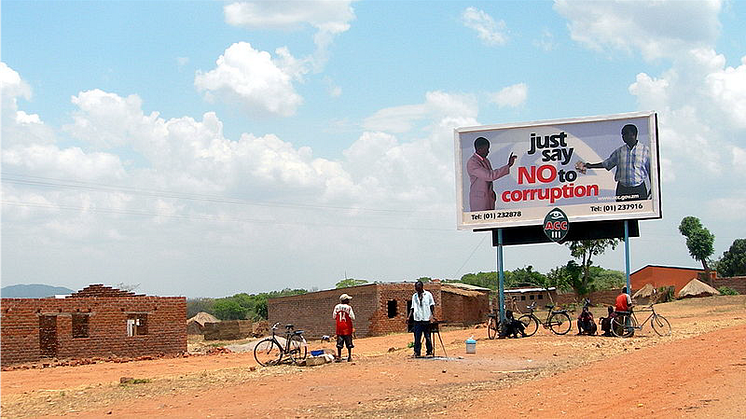
Blogginlägg -
Understanding corruption through social norms – A field study about corrupt behaviour in local institutions in Lusaka
Siri Ahlzén received an ICLD fieldwork grant in 2018 and did her fieldwork in Zambia. She recently graduated with a master’s in Political Science from Uppsala University. Her thesis, ‘Understanding corruption through social norms – A field study about corrupt behaviour in local institutions in Lusaka’, aimed to explore the role of social norms in fighting corruption in the local government in Lusaka, and in so doing, better understand some of the reasons behind corrupt activities. Here she shares her reflections on her experience and the findings of her research.
“You’re studying corruption? Oh, you’ve come to the right place”. This is the most common reaction from Zambians when telling them about the research I was doing there. This depicts the sad truth of how common corruption in Zambia is perceived. Prior to my research project I followed Zambian politics closely as an intern at the political section of the Swedish Embassy in Lusaka and got an insight in the massive impact corruption has on all parts of Zambian society.
Despite many efforts from the Zambian government and foreign donors, corruption remains rampant. The contradiction of rising corruption levels while introducing stricter corruption policies is what sparked my interest in wanting to investigate more into corruption as a phenomenon, and why it seems so difficult to tackle. I wanted to explore a perspective that previously often has been left out of corruption research, namely the impact of social norms on corrupt behaviour.
A paradox between moral values and engagement in corrupt activities
My thesis investigated what social norms exists in relation to corrupt behaviour among citizens interacting within local government institutions in Lusaka, and how these social norms can explain the persisting corruption within local institutions. In order to examine this, I conducted interviews with Zambian citizens about their experiences relating to corruption when interacting with local government institutions in Lusaka. Finding people to interview was a challenge since corruption is after all illegal, despite everyone being aware of how common it is, so people are not keen to talk openly about their personal experiences. Here my previous connections proved invaluable. The fact that I had already established relations with many Zambians after living in Lusaka several months before the start for the research project meant that I had established the trust required for people to speak openly and truthfully about them engaging in corrupt activities.
Unfortunately, it came as no surprise that my interviews showed that all of the participants have experienced corrupt situations, or have been engaging in corruption themselves, when interacting with local government institutions in Lusaka. Petty corruption is seen as very common and all participants could identify both advantages and disadvantages with corrupt acts. I could identify a paradox between the fact that all participants considered corruption morally wrong, but still admitted to engaging in corrupt activities at times. In my study I attempt to explain this paradox by referring to descriptive norms that describe how most people act in certain situations, and thus indicates the probability of others to follow the same behaviour. In Lusaka many knows that the “normal” way of dealing with administrative issues is corruption and hence this has shaped a norm that many adhere to.
The importance of underlying norms
By studying corruption out of a social norms perspective my study argues that it is not only institutional factors that can explain why corruption has become common within local government institutions in Lusaka, but also certain norms that are favourable to engaging in corrupt behaviour are shared by Lusaka citizens. The study thus demonstrates underlying reasons to why people engage in corrupt behaviour and clarifies what social norms are relating to corruption.
In large, this also contributes to a deepened understating of corruption and adds to the understating of why conventional anticorruption interventions that have been introduced in Zambia has not yielded any major results. I want to argue that results of my research can show that social norms are in fact of high relevance when investigating corrupt patters within a society. Moreover, it gives new insight into the Zambian local context that might provide a basis for similar studies that can be used when designing anticorruption policies in the country.
/Siri
_______
The views and opinions expressed in this article are those of the author and do not necessarily reflect the official policy or position of ICLD.
